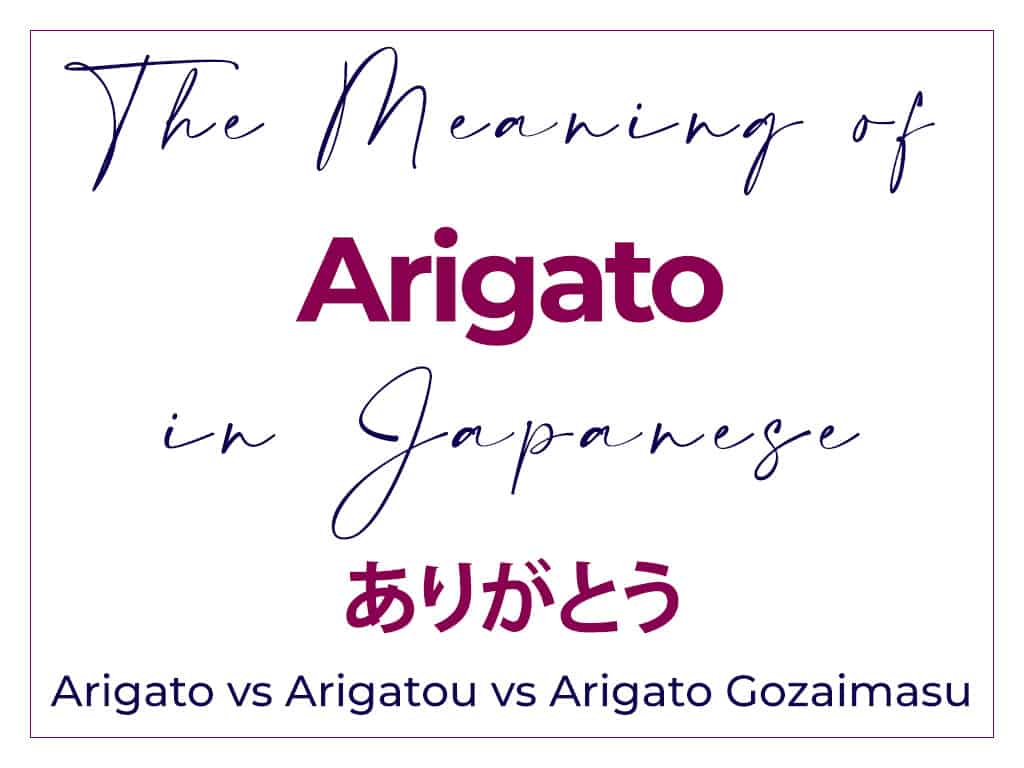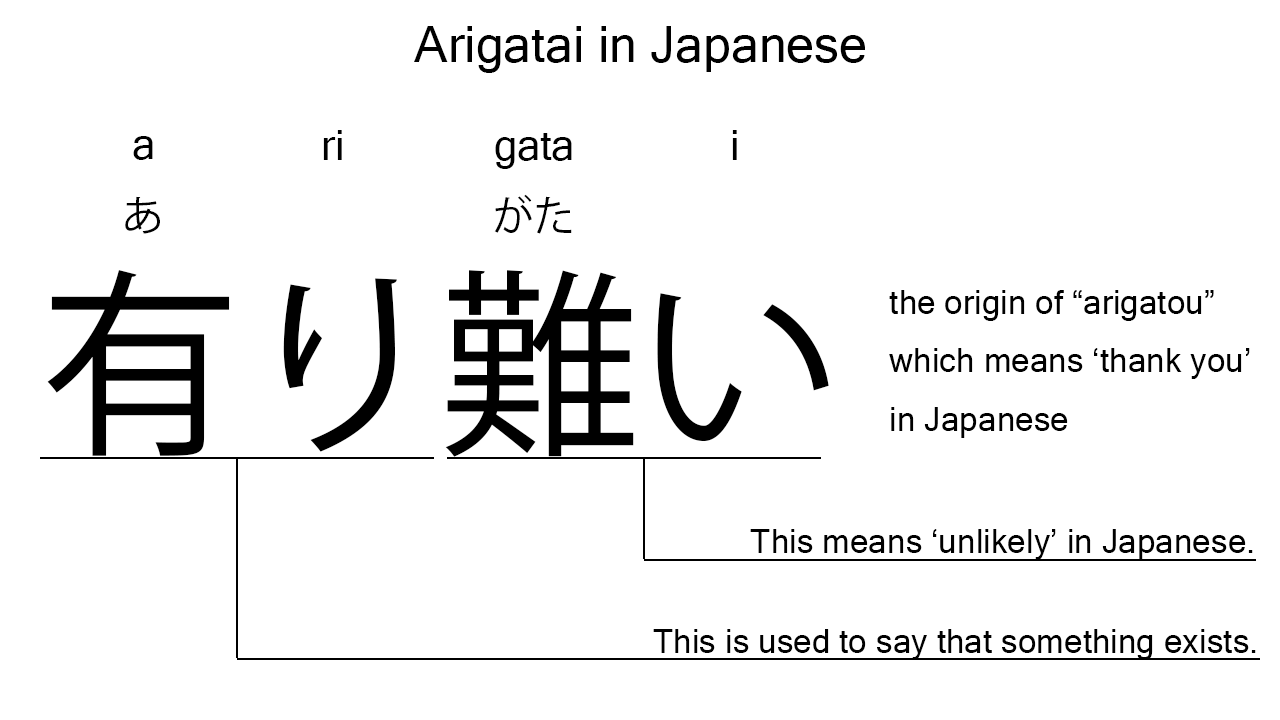Understanding The Meaning Of "Arigato": A Deep Dive Into Japanese Gratitude
In the realm of languages, few words carry the weight of emotion and significance as the Japanese term "arigato." This simple yet profound word encapsulates the essence of gratitude in Japanese culture, reflecting a deep appreciation for kindness and support. It is more than just a polite expression; it is a heartfelt acknowledgment of the value of relationships and the interconnectedness of individuals in society. In this article, we will explore the meaning of "arigato," its cultural significance, and how it is used in various contexts within Japanese society.
The use of "arigato" extends beyond mere politeness; it serves as a bridge between speaker and listener, fostering a sense of community and respect. Understanding this term is crucial for anyone interested in Japanese culture, whether for travel, business, or personal relationships. This exploration will delve into the origins of the word, its variations, and its relevance in modern Japan.
As we journey through the intricacies of "arigato," we'll also touch upon the principles of E-E-A-T (Expertise, Authoritativeness, Trustworthiness) and YMYL (Your Money or Your Life), ensuring that the information provided is reliable and insightful. Join us as we uncover the layers of meaning behind this beautiful expression of gratitude.
- Travel In Jinzhou Gulpuffs An Unforgettable Coastal Adventure
- It Was Only Just A Dream The Journey Of Hope And Resilience
Table of Contents
- 1. The Origin of "Arigato"
- 2. Cultural Significance of "Arigato"
- 3. Variations of "Arigato"
- 4. Usage of "Arigato" in Daily Life
- 5. Formal vs. Informal Expressions
- 6. Contextual Examples of "Arigato"
- 7. Impact on Relationships
- 8. Conclusion
1. The Origin of "Arigato"
The word "arigato" (ありがとう) has its roots in the Japanese language, derived from the adjective "arigatai" (有り難い), which means "difficult to exist" or "rare." This etymology highlights the underlying sentiment of gratitude as an acknowledgment of the rarity and value of kindness shown by others. Understanding this origin provides insight into why expressing gratitude is so deeply ingrained in Japanese culture.
2. Cultural Significance of "Arigato"
In Japan, expressing gratitude is not merely a formality; it is a fundamental aspect of social interaction. The importance of "arigato" reflects the broader cultural values of respect, humility, and interconnectedness. Here are some key points regarding its cultural significance:
- The concept of "wa" (和) emphasizes harmony and group cohesion, making expressions of gratitude vital for maintaining relationships.
- Gratitude is often expressed not only verbally but also through actions, such as gift-giving and reciprocation of kindness.
- Children are taught from an early age the importance of saying "arigato" as a way to foster respectful relationships.
3. Variations of "Arigato"
While "arigato" is the most commonly used term for expressing gratitude, there are several variations that convey different levels of formality and context:
- Arigato gozaimasu (ありがとうございます): A more formal version, often used in business settings or when addressing someone of higher status.
- Arigato gozaita (ありがとうございました): The past tense form, used to express gratitude for something that has already happened.
- Doumo (どうも): A casual and versatile term that can be used in various contexts, often combined with "arigato" for emphasis.
4. Usage of "Arigato" in Daily Life
In daily life, "arigato" is used in numerous situations, from simple interactions to significant gestures of kindness. Here are some common scenarios:
- Thanking a friend for a favor or assistance.
- Expressing appreciation to service staff in restaurants or stores.
- Acknowledging help from colleagues in a work environment.
5. Formal vs. Informal Expressions
Understanding the distinction between formal and informal expressions of gratitude is essential for navigating social situations in Japan:
Formal Expressions
In formal settings, such as business meetings or when addressing elders, using "arigato gozaimasu" is appropriate to convey respect.
Informal Expressions
Among friends or peers, "arigato" or "doumo" can be used casually, reflecting a more relaxed relationship.
6. Contextual Examples of "Arigato"
Here are some contextual examples that highlight the use of "arigato" in various situations:
- After receiving a gift: "Arigato gozaimasu for the wonderful present!"
- When someone helps you with directions: "Arigato for your help!"
- At a restaurant after a meal: "Arigato gozaimashita!" (thanking the staff for the service).
7. Impact on Relationships
The act of expressing gratitude through "arigato" has a profound impact on relationships in Japanese culture. It fosters goodwill, strengthens bonds, and encourages a cycle of kindness. Here are some insights into this impact:
- Regular expressions of gratitude can enhance trust and mutual respect in personal and professional relationships.
- Acknowledging others' contributions can lead to increased collaboration and support.
- Incorporating gratitude into daily interactions can promote a positive atmosphere in both social and work environments.
8. Conclusion
In conclusion, the meaning of "arigato" extends far beyond a simple thank you; it embodies the cultural values of gratitude, respect, and interconnectedness that define Japanese society. By understanding the origins, variations, and cultural significance of this term, we can appreciate the depth of emotion it conveys. We encourage readers to reflect on the importance of gratitude in their own lives and to consider how they can incorporate expressions of appreciation into their daily interactions.
If you found this article insightful, please leave a comment, share it with others, or explore more articles on our site to deepen your understanding of Japanese culture.
Thank you for reading, and we hope to see you again soon!



Detail Author:
- Name : Ayla Altenwerth
- Username : jan.schowalter
- Email : jbruen@robel.info
- Birthdate : 1986-04-02
- Address : 93968 Lynch Forges Dariantown, MS 96347-6910
- Phone : +1-763-910-0172
- Company : Kshlerin Group
- Job : Employment Interviewer
- Bio : Assumenda aut dicta et ab. Sit reiciendis beatae in et qui. Sed velit sequi eligendi quaerat. Enim eveniet culpa inventore porro rerum. Dolor accusantium ut id et impedit non repellat.
Socials
tiktok:
- url : https://tiktok.com/@wizac
- username : wizac
- bio : Repellat nobis alias officia. Ipsum sed veniam non dolore perferendis est.
- followers : 5398
- following : 2938
facebook:
- url : https://facebook.com/candicewiza
- username : candicewiza
- bio : Animi tempora et accusantium expedita eveniet asperiores.
- followers : 1702
- following : 354
twitter:
- url : https://twitter.com/candice5652
- username : candice5652
- bio : Sunt quia rerum eius nihil ut deserunt nihil. Nemo autem nobis et numquam corporis ea. Id soluta laudantium quis optio aliquam et aspernatur.
- followers : 2698
- following : 2601
instagram:
- url : https://instagram.com/wiza1978
- username : wiza1978
- bio : Consequatur rerum quia qui autem sint natus at. Ut quasi magni quis. Omnis velit quam iusto eaque.
- followers : 450
- following : 2611